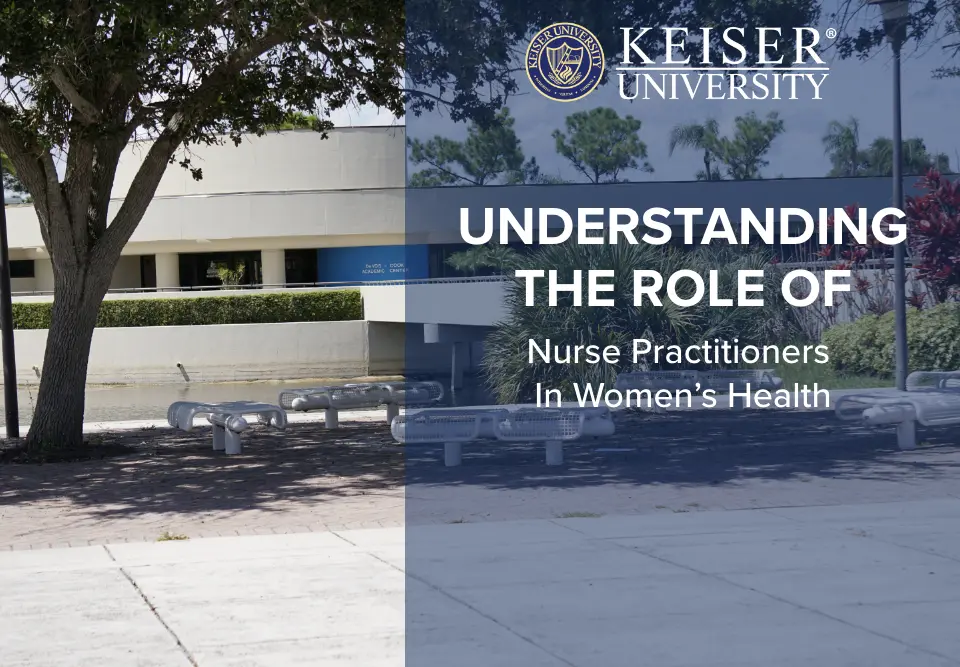If you are a nurse practitioner or are considering becoming one, you may wonder if you have to work in primary care or if you can work in a specialty like women’s health. In healthcare, the demand for trained women’s health providers continues to grow. These professionals are specially trained to care for women throughout the course of their lives, know the risk factors of common female health conditions, and treat these conditions to help women enjoy the best quality of life. A women’s health nurse practitioner can fulfill an important role in this aspect of the healthcare industry.
What Is a Women’s Health Nurse Practitioner (WNHP)?
A women’s health nurse practitioner (WHNP) is an advanced practice registered nurse (RN) who has specific training in caring for the needs of women. The many different factors that can go into women’s healthcare, including obstetrics, gynecology, fertility, and maternal/fetal medicine, all demand specialized training. These specially trained practitioners are prepared to help with:
- Gynecological care
- Pregnancy care
- Pregnancy risk management
- Postnatal care
- STI diagnosis and treatment
- Family planning and fertility
- Female oncology diagnosis and care
- Primary care for women
With the advanced training and clinical experience that earns a nurse a WHNP degree, many states allow these practitioners to work on their own. All states allow them to diagnose and treat illnesses and conditions for their patients, referring to doctors only for more complicated patient care, such as high-risk pregnancies. This advanced training allows a nurse practitioner to prescribe medication and perform many procedures, however, WHNP’s do not deliver babies. In many states, nurse practitioners are free to practice independently, though some states require them to work in conjunction with a doctor.
WHNPs Importance in Healthcare
Women have a wide range of health needs that require specialized care. In addition to basic primary care, the complexities of the female reproductive system can cause a wide range of health concerns unique to women. Pregnancy and reproductive health drive much of the demand for nurses trained in women’s healthcare.
WHNPs Increasing Demand
Over half of the current United States population is female. This means that there is already a higher demand for trained women’s healthcare providers. In addition, the CDC indicates women are more likely to visit the doctor than men. This combination means that WHNPs are in higher demand than other types of nurse practitioners and primary care providers.
Areas of Practice for Women’s Health Nurse Practitioners
A women’s health nurse practitioner fulfills a vital role within the healthcare field with the specialized training they receive in women’s health. There are multiple areas of practice for a WHNP to consider. These include:
Primary Care
Primary care nurse practitioners provide care for common medical problems. This practitioner is one of the first providers a woman will see when she has a health complaint, even if that complaint requires a more specific level of care. This practitioner is also the one people will see for colds, viruses, and basic injuries. They can diagnose illnesses, prescribe medication, and refer patients to specialty care when needed.
Prenatal and Postpartum Care
Prenatal care is vital for helping create positive outcomes for mothers and their babies, and this type of care requires special training in pregnancy and birth. The abilities and care of a skilled nurse has a huge impact on pregnancy outcomes, especially for very young or older mothers. Pregnant women can experience any number of complications that require a skilled hand, including diabetes, anemia, and emotional concerns.
An NP who is trained in women’s health is often the person who performs prenatal and postnatal care. While these practitioners must transfer care to a doctor in high-risk, complicated, or surgical births, the vast majority of pregnancies are perfectly situated for care from a WHNP. Many OB-GYN practices will employ both a doctor and a nurse practitioner to allow them to care for all the types of mothers that come to their practices.
After a baby is born, women need specialized care to recover from birth and manage breastfeeding and other infant care concerns. A WHNP provides postnatal care to ensure full healing after birth and to diagnose postnatal concerns.
Life Care Through Menopause
The need for specialty nurse practitioner oversight doesn’t end after the childbearing years. Women also need this care as they enter menopause. The changes in hormones women experience as they age can cause a wide range of health complaints. While these aren’t necessarily health problems, they can be treated by a properly trained provider to make this life change more comfortable.
In addition, women who are not pregnant but are menopausal need regular checkups to screen for problems like ovarian and cervical cancer, thyroid conditions, and osteoporosis. While a primary care provider can provide these checkups, someone trained in women’s health is going to be more adept at spotting early warning signs, and many women feel more comfortable and confident working with a specialist for these types of appointments. Again, this is where a trained WHNP can assist.
General Wellness and Preventive Care
One of the passions of many nurse practitioners is not just diagnosing illness but also helping patients avoid illness through proper preventive care and general wellness education. As part of their practice, these healthcare professionals will teach women about what they need to do to prevent sickness and enjoy better overall health. By arming patients with knowledge about their overall health, a WHNP can help women enjoy a longer, healthier life.
These practitioners also help screen for depression, anxiety, and domestic abuse. These common mental and emotional health concerns can be hard to spot, and the right training can assist these practitioners in detecting subtle signs so they can get the right help for their patients.
WHNP Certification
Women’s Health Nurse Practitioners must complete proper certification to ensure they are well-versed in female health. This starts with the WHNP Exam from the National Certification Corporation. These nurses will also need to apply for WHNP certification in their state. A quality Women’s Health Nurse Practitioner degree program will provide instruction to prepare a nurse for these certification exams.
How to Become a Women’s Health Nurse Practitioner
Are you wondering how to become a WHNP? Because this is a specialty focus in medicine, there is a specific series of steps to follow. These are:
1. Become a Registered Nurse
Women’s Health Nurse Practitioner programs require applicants to be registered nurses. You must pass the NCLEX-RN exam and become certified in your particular state. Most programs appreciate working with nurses who have worked for at least a year as an RN before applying. Always check with the program you are pursuing to see what prerequisite job experience and training it requires.
2. Apply to Your Program
After completing your RN training and getting some work experience under your belt, you can apply to a Women’s Health Nurse Practitioner training program. The Master of Science in Nursing, Women’s Health Nurse Practitioner program from Keiser University is an excellent choice. It is the only master’s program for this specialty in the state of Florida, and it is available as a fully online program. Most students can complete the program in 30 months, and you can continue working while you learn.
3. Get Certified
The final step in becoming a WHNP is to get certified. You will need to pass the exam from the National Certification Corporation and the state exam in your state. Once you have done both, you are ready to start working with women to help them enjoy a greater quality of life, better pregnancy outcomes, and more healthful aging.
If working with women through all stages of life is appealing to you, then consider becoming a women’s health nurse practitioner. Reach out to Keiser University to learn more about our WHNP MSN program today, and see how you can use our training to improve your skills and make you a more effective nurse for women of all ages.






 The instructors at Keiser University impacted my life. They believed in my ability to become a great graphic designer, regardless of how I felt about my skills. KU helped to prepare me for the real world and got me to where I am today.
The instructors at Keiser University impacted my life. They believed in my ability to become a great graphic designer, regardless of how I felt about my skills. KU helped to prepare me for the real world and got me to where I am today.
